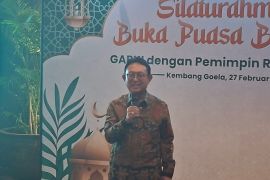"I just arrived from Istanbul (Turkey) to attend the 3rd Congress of the AACCEI, and during the congress Indonesia was named president of the association with 13 member countries for the period of 2014-2016," the Indonesian Constitutional Court chief said here on Monday.
In connection to the appointment, Hamdan said, "I appeal for support so that we could carry out the mandate well, including preparing for the next congress of the association in 2016," he said at the opening of a national seminar on legislative and presidential elections.
He added that democracy is the best choice for nations, among the existing alternatives, because it assures public participation, controlling mechanisms, freedom of expression and human rights.
However, its application may be different from one country to another. General elections are an application of democracy and have not done well in Thailand, the Philippines and Malaysia. Indonesia, meanwhile, has so far been able to conduct its third and fourth general elections, respectively in 2009 and 2014," he said.
If Indonesia could surpass the critical stages, it would enter a democratic consolidation process in a measured way, he said, adding "measured democracy is unpredictable and regulated by law and the constitution."
He said democracy in Indonesia was now different from what was seen during the New Order era, when winners could be predicted before elections, adding that now the winner of the general elections was unpredictable, marked by failed predictions from many survey institutions.
As an example, he referred to predictions that Islamic political parties would not be able to receive more than four percent of the votes in the last legislative elections on April 9. He said their predictions had been wrong, because the parties were all found to be able and received 7 to nine percent of the total vote.
Hamdan Zoelva, meanwhile, predicted that the number of election disputes following the recent legislative elections would be reduced by 50 percent from the last general elections in 2009, in which 627 disputed were filed.
This could happen because the number of political parties that took part in the last elections has fallen to only 15, including three local parties, from an earlier high of 36. (*)
Editor: Heru Purwanto
Copyright © ANTARA 2014











